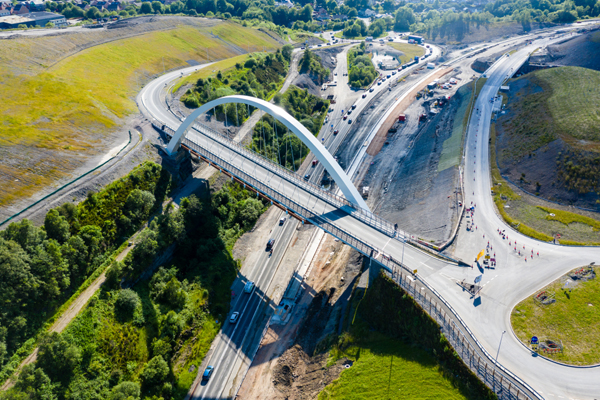The Transport Planning Society has called for an overhaul of British transport governance, funding and appraisal, effectively asking for an end to investment in large new road projects due to their carbon impact
Among the list of recommendations in its 'state of the nation' report, the TPS highlights the importance of moving away from car-based transport and limiting pollution and carbon emissions through transport schemes.
'Significant funding in all three countries [in Britain] is still going on major road projects, and this appears to run counter to Government transport objectives. Transport projects which increase carbon emissions must be withdrawn and funding for low and zero carbon transport projects and networks increased.'
It argues that the London model of integrated transport and spatial planning, with delivery and revenue raising powers and the imposition of charges to reduce car use is one that should be expanded to sub-national transport bodies throughout Britain.
'Transport planning needs to be more inclusive: it needs to unhook people from car dependence, giving them healthier and more sustainable travel choices, including travelling less. It also has to help tackle climate change; previous patterns of surface travel, dominated by private cars and trucks fuelled by oil, must change dramatically,' the report states.
It adds that the Government should 'reduce the cost of using public transport and allow local authorities to do so in their areas'.
TPS chair Stephen Bennett said: 'For the first time, we have brought together a comprehensive review of all aspects of the transport system that combine to produce the outcomes we see around us.
'The research makes clear that to create a sustainable system and healthier places for people, we need to release ourselves from car-dependency. That means government seriously shifting resources to sustainable Transport, ensuring this is integrated with the planning system and reducing the cost of using public transport.
'We need to make sustainable modes of transport the easiest and safest choices, resulting in cleaner air, healthier lifestyles and potential savings.'

The Jack Williams Gateway Bridge, part of the Welsh Government's A465 Heads of the Valleys project
The research was undertaken on behalf of TPS by the Smart Mobility Unit at the University of Hertfordshire.
The report only covers England, Wales and Scotland, as they have 'similar transport governance arrangements and travel characteristics'.
It highlights that: 'Transport is the UK's largest source of greenhouse gas emissions (28% in 2018) it is key to any strategy to combat climate change and improve health and wellbeing: Unlike other sectors, emissions from road transport increased by 6% from 1990 to 2017. In June 2019, the Government passed a law that requires 'net zero' greenhouse gas emissions by 2050.'
Recommendations and conclusions
- Transport policies need to provide a clear route map to net zero by 2050 and meet the five-year carbon budgets set under the Climate Change Act. This will involve 'avoid, shift, improve' strategies – reducing travel through better planning, shifting travel from low occupancy motor vehicles to shared, active and sustainable transport, and electrifying and improving the motor vehicles
- The current systems of transport appraisal, forecasts and modelling do not reflect current realities and priorities, notably decarbonising ransport, support for disadvantaged people and communities and the promotion of active travel. The Government should conduct a fundamental reform of these systems and the business cases that result from them.
- The Government should draw up a national transport strategy for England to provide a framework for its different strategies and guidance and link it explicitly to its National Planning Policy Framework.
- The Government should reduce the fragmentation and complexity of transport decision-making and increasing accountability. In all three countries, local transport authorities and sub-national transport bodies should have the powers, duties and funding to tackle transport challenges, especially reducing carbon emissions.
- Local authorities should have a long-term funding regime including an increase in cash for packages of local measures to support zero carbon and sustainable transport.
- Governments and local authorities should promote and fund 'Total Transport' schemes to co-ordinate and bring together different transport services and funds from different public bodies.
- Local authorities should have a wider variety of powers to raise funding for Transport. Examples include the 'versement transport' in France (an employers' payroll tax dedicated to transport), 'visitor lodging levies' in Switzerland and local sales and property taxes in Germany and the US. Capturing the land value uplift from new transport projects could also generate significant sums.
- Local authorities should make greater use of existing charging powers. In particular, more places should consider using workplace parking levies, business supplements, improvement districts and other powers to manage traffic and congestion.
Register now for full access
Register just once to get unrestricted, real-time coverage of the issues and challenges facing UK transport and highways engineers.
Full website content includes the latest news, exclusive commentary from leading industry figures and detailed topical analysis of the highways, transportation, environment and place-shaping sectors.
Use the link below to register your details for full, free access.
Already a registered? Login